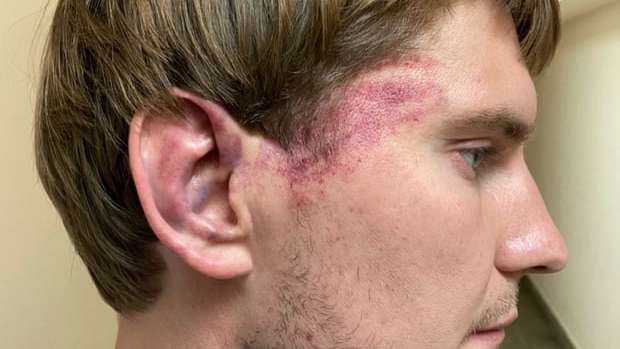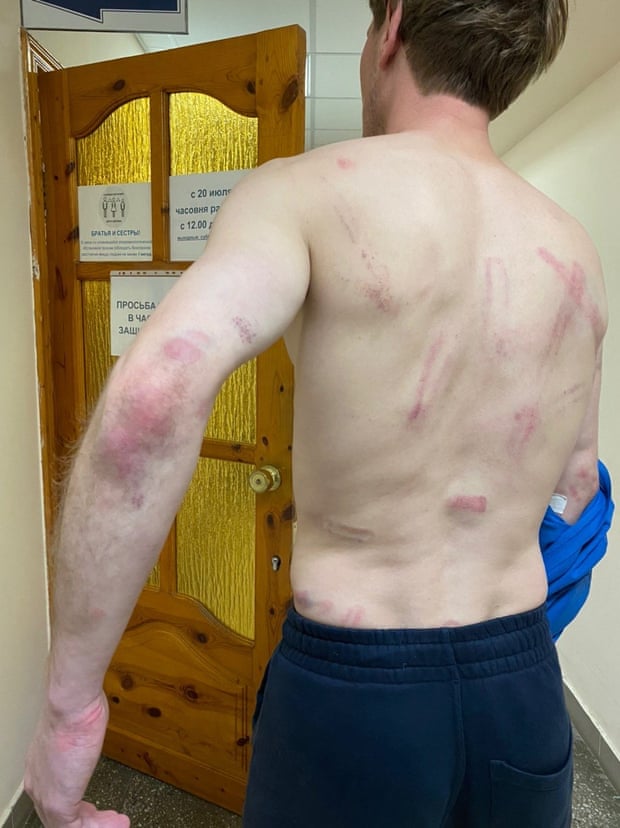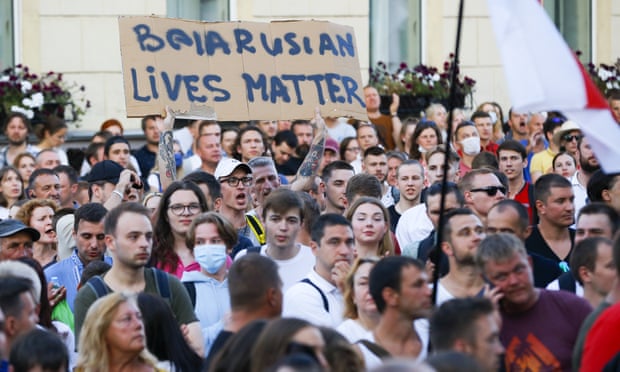Belarusians seek justice for brutal beatings by riot police
Shaun Walker in Minsk and Andrew Roth in Moscow, The Guardian
21 August 2020, 17:20
 Pavel Daroshka was one of thousands of Belarusians to be arrested by riot police on the thinnest of pretexts last week, and then fall into a nightmare of brutal and demeaning violence.
Pavel Daroshka was one of thousands of Belarusians to be arrested by riot police on the thinnest of pretexts last week, and then fall into a nightmare of brutal and demeaning violence.
Now he is determined to at least try to bring the men who beat him to justice, however unlikely it might be while President Alexander Lukashenko remains in charge of the country.
“It’s not about getting anything financial, it’s about making the people who did all of this have to pay a price,” said Daroshka in an interview at a hospital outside Minsk, where he was still recovering from his injuries, including concussion and severe bruising, several days after his release.
As stories of abuse, beatings and torture continue to emerge, many of the more than 7,000 people to be detained in the aftermath of Lukashenko’s rigged election win last week are considering their options for legal redress.
![Belarusians seek justice for brutal beatings by riot police]()
“A lot of people say, ‘I want to tell my story to the world, everyone needs to know what happened here in Belarus.’ Others want justice … They want these people to be punished for what they did to them.”
Daroshka, 32, the technical director of an energy infrastructure company, decided immediately that he wanted to press charges over his ordeal.
Shortly after midnight on Wednesday, he was driving three friends home from dinner in Minsk, when riot police in balaclavas stopped the car at a deserted intersection and ordered all four to get out of the car. Screaming abuse and pointing weapons at them, the police demanded that they unlock their mobile phones and show the photograph galleries.
None of the four had attended the protests of the previous nights, but one friend had photographed some protesters from the car. The discovery of that photograph was enough of a pretext for the riot police to shove all four to the ground and tie their hands with plastic wire.
They were then pushed into a police van that already had numerous people in it, most of them lying on the floor. “There were bodies everywhere and people screaming that they couldn’t breathe. The police kicked me towards these people and I had to step on them to get to a bit of space,” said Daroshka. Police also cut off the long hair of one of his friends with a knife.
![]()
He was transferred between police vans twice more, each time violently, and later arrived at the now-notorious Okrestina prison, where he was forced to remain still in various stress positions. If anyone moved even slightly, guards would beat them repeatedly with batons. When Daroshka complained he was feeling dizzy, a guard pulled him by the hair and shoved him to the ground, where he was beaten again.
Andrei Vershenia, 36, a driver who was also held at Okrestina at the same time, said he was forced to shout, “Glory to the riot police” and sing the Belarusian national anthem while being beaten. “The sound of everyone screaming was awful. It was like the sound of a pig being slaughtered,” he said.
Both men were later taken away from the prison by ambulance and admitted to hospital, in Daroshka’s case because he had been hit on the head with batons and began to lose consciousness. He was eventually released from hospital on Tuesday, and still has no information about his car, which was left unlocked in the street after his arrest.
Daroshka has hired a lawyer and filed a claim over the injuries he sustained, but when an investigator came to take his testimony in the hospital last Thursday, it seemed she was treating him as a suspect rather than a victim.
“She was asking me what messaging apps I used on my phone, what my political views were, and nothing about the beating,” he said. He called his lawyer, who advised him to stop the conversation immediately. Vershenia said he had a similar experience with the same investigator.
The next day, the investigator returned and this time did listen to his story in detail, but Daroshka is not optimistic of seeing justice. He said: “It was clear from her eyes that she understood everything and even had a few tears, but she’s part of the system, it’s clear she has her orders.”
Some other victims have not sought legal advice, either because they want to move on from the ordeal, or out of fear.
“People are broken, afraid to leave the house even to go to the doctor, afraid to apply to the prosecutor’s office or the investigative committee about the beatings,” said Ekaterina Zheltonoga, a lawyer whose firm has received dozens of complaints.
A new website, probono.by, helps connect victims to lawyers and psychologists willing to help, as well as sharing registries of those who were detained and the more than 50 people who are still registered as missing. “Lots of people want to help. All the country wants to help each other,” said one organiser, a startup lawyer, who asked not to be identified.
Lukashenko on Tuesday gave awards to 300 people, including those directly in charge of the structures that carried out the violence last week, making it even more unlikely that any investigation will be impartial as long as the current president remains in control.
“We need to have political will for that. And I hope we will have this political will very soon,” said Stefanovich. He added that Viasna plans to appeal to the UN Committee Against Torture, believing that the brutality meets the criteria of being “systematic and massive” for the UN to open an investigation.
“The UN can’t put Lukashenko into prison, unfortunately. But they can say please don’t do that any more. Unfortunately, this is all we can do.”
21 August 2020, 17:20

Pavel Daroshka, 32, was arrested and beaten by riot police despite not taking part in the protests. Photograph: c/o Pavel Daroshka
Now he is determined to at least try to bring the men who beat him to justice, however unlikely it might be while President Alexander Lukashenko remains in charge of the country.
“It’s not about getting anything financial, it’s about making the people who did all of this have to pay a price,” said Daroshka in an interview at a hospital outside Minsk, where he was still recovering from his injuries, including concussion and severe bruising, several days after his release.
As stories of abuse, beatings and torture continue to emerge, many of the more than 7,000 people to be detained in the aftermath of Lukashenko’s rigged election win last week are considering their options for legal redress.

Pavel Daroshka, 32, was arrested and beaten by riot police. Photograph: c/o Pavel Daroshka
Valiantsin Stefanovich of Viasna, a Belarusian human rights organisation, said the group has received more than 200 requests for legal help due to torture, both from victims who visited their offices to document extralegal violence, and from online submissions.“A lot of people say, ‘I want to tell my story to the world, everyone needs to know what happened here in Belarus.’ Others want justice … They want these people to be punished for what they did to them.”
Daroshka, 32, the technical director of an energy infrastructure company, decided immediately that he wanted to press charges over his ordeal.
Shortly after midnight on Wednesday, he was driving three friends home from dinner in Minsk, when riot police in balaclavas stopped the car at a deserted intersection and ordered all four to get out of the car. Screaming abuse and pointing weapons at them, the police demanded that they unlock their mobile phones and show the photograph galleries.
None of the four had attended the protests of the previous nights, but one friend had photographed some protesters from the car. The discovery of that photograph was enough of a pretext for the riot police to shove all four to the ground and tie their hands with plastic wire.
They were then pushed into a police van that already had numerous people in it, most of them lying on the floor. “There were bodies everywhere and people screaming that they couldn’t breathe. The police kicked me towards these people and I had to step on them to get to a bit of space,” said Daroshka. Police also cut off the long hair of one of his friends with a knife.

People gather at a detention centre in Minsk, Belarus, after reports of police violence provoked widespread anger. Photograph: Sergei Grits/AP
He was transferred between police vans twice more, each time violently, and later arrived at the now-notorious Okrestina prison, where he was forced to remain still in various stress positions. If anyone moved even slightly, guards would beat them repeatedly with batons. When Daroshka complained he was feeling dizzy, a guard pulled him by the hair and shoved him to the ground, where he was beaten again.
Andrei Vershenia, 36, a driver who was also held at Okrestina at the same time, said he was forced to shout, “Glory to the riot police” and sing the Belarusian national anthem while being beaten. “The sound of everyone screaming was awful. It was like the sound of a pig being slaughtered,” he said.
Both men were later taken away from the prison by ambulance and admitted to hospital, in Daroshka’s case because he had been hit on the head with batons and began to lose consciousness. He was eventually released from hospital on Tuesday, and still has no information about his car, which was left unlocked in the street after his arrest.
Daroshka has hired a lawyer and filed a claim over the injuries he sustained, but when an investigator came to take his testimony in the hospital last Thursday, it seemed she was treating him as a suspect rather than a victim.
“She was asking me what messaging apps I used on my phone, what my political views were, and nothing about the beating,” he said. He called his lawyer, who advised him to stop the conversation immediately. Vershenia said he had a similar experience with the same investigator.
The next day, the investigator returned and this time did listen to his story in detail, but Daroshka is not optimistic of seeing justice. He said: “It was clear from her eyes that she understood everything and even had a few tears, but she’s part of the system, it’s clear she has her orders.”
Some other victims have not sought legal advice, either because they want to move on from the ordeal, or out of fear.
“People are broken, afraid to leave the house even to go to the doctor, afraid to apply to the prosecutor’s office or the investigative committee about the beatings,” said Ekaterina Zheltonoga, a lawyer whose firm has received dozens of complaints.
A new website, probono.by, helps connect victims to lawyers and psychologists willing to help, as well as sharing registries of those who were detained and the more than 50 people who are still registered as missing. “Lots of people want to help. All the country wants to help each other,” said one organiser, a startup lawyer, who asked not to be identified.
Lukashenko on Tuesday gave awards to 300 people, including those directly in charge of the structures that carried out the violence last week, making it even more unlikely that any investigation will be impartial as long as the current president remains in control.
“We need to have political will for that. And I hope we will have this political will very soon,” said Stefanovich. He added that Viasna plans to appeal to the UN Committee Against Torture, believing that the brutality meets the criteria of being “systematic and massive” for the UN to open an investigation.
“The UN can’t put Lukashenko into prison, unfortunately. But they can say please don’t do that any more. Unfortunately, this is all we can do.”

